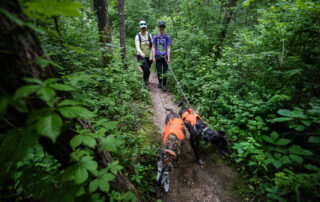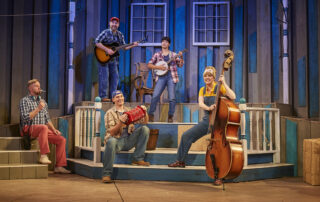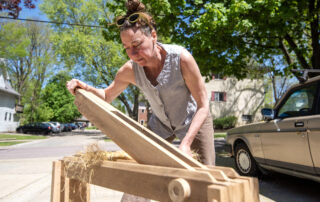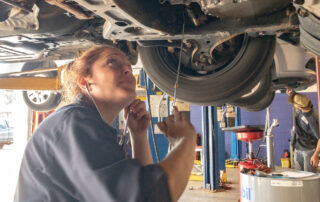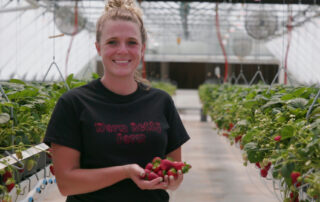Wisconsin’s state parks and golf courses are now open, but many other spring staples are closed due to the coronavirus pandemic. The Milwaukee Brewers would normally be more than a month into their regular season by now. And down the road from Miller Park, the Milwaukee County Zoo would be bustling with activity.
“We were on track for probably the best first quarter we’ve had in years, as far as attendance and revenue,” zoo director Chuck Wikenhauser said. “That evaporated very quickly.”
Like most zoos across the state, it closed in March as part of Wisconsin’s efforts to slow the spread of the coronavirus.
The pandemic has posed unprecedented challenges for many industries, including zoos. If the NEW Zoo & Adventure Park in Suamico is closed for just a couple months during its peak season, it could miss out on half its annual revenue, said education curator Angela Kawski.
At the same time, it’s business as usual for zookeepers, who aren’t skimping on animal care despite challenges presented by the new coronavirus.
“We Are Just Focusing On Our Animals”
Without money coming in, the NEW Zoo has had to tighten its purse strings, Kawski said. But it has no plans to cut corners when it comes to animal care, she added.
Keepers at the Milwaukee County Zoo are considered essential, and animal care positions are exempt from any hiring freezes, Wikenhauser said.

Milwaukee County Zoo Director Chuck Wikenhauser at Otter Passage opening, May 2018. (Courtesy of Milwaukee County Zoo)
Caretakers have always worn personal protective equipment around the great apes and primates. Their close relationship to humans makes them particularly vulnerable to our diseases, Wikenhauser said. (In fact, each year the bonobos and orangutans at the Milwaukee County Zoo get flu shots.)
There have been no documented cases of the new coronavirus spreading to orangutans, gorillas, chimpanzees or bonobos, but tigers at the Bronx Zoo have tested positive for it, Wikenhauser said.
That’s why staff at the Milwaukee County Zoo are taking extra precautions. Keepers are now suiting up before working with the big cats, small mammals and red pandas too.
Fortunately, the zoo had significant PPE reserves on hand before the pandemic, Wikenhauser said. It even shared some of its surplus with local first responders.
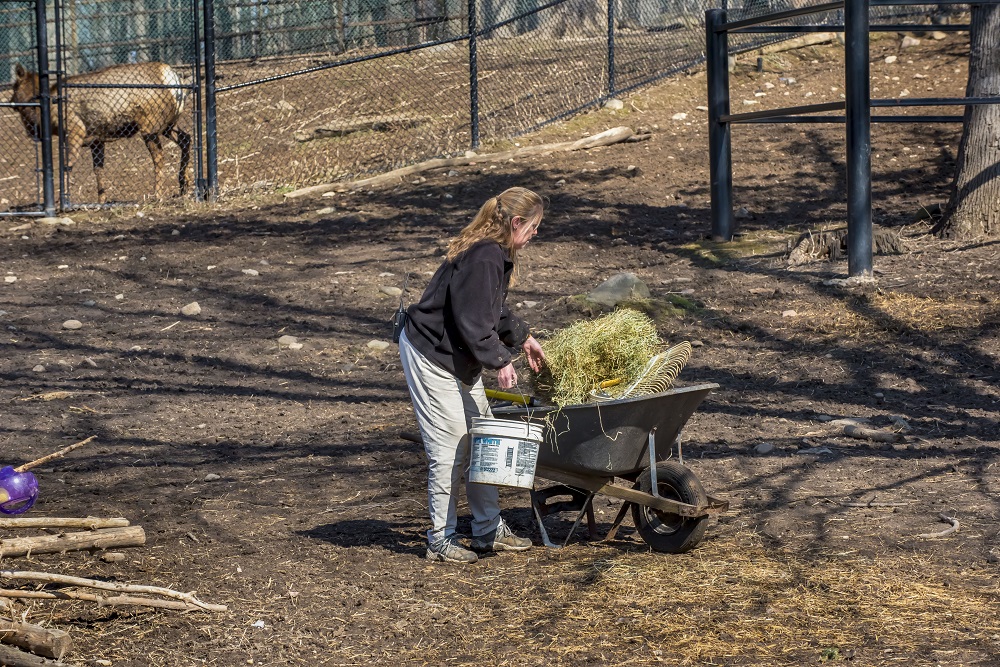
Milwaukee County Zoo area supervisor Dawn Fleuchaus working in one of the Zoo’s North American exhibits. (Courtesy of Milwaukee County Zoo)
Dawn Fleuchaus, a North American keeper at the Milwaukee County Zoo, said she feels lucky that her day-to-day job is largely the same as it was before the pandemic. She still checks on the animals, feeds them and cleans up. But she doesn’t have as much extra stuff going on, she said.
“Basically, we just are focusing on our animals which is kind of nice,” she said.
For Fleuchaus, those animals include four seals, four grizzly bears, a brown bear, five elk, a badger and a moose. Some have recently come out of hibernation.
Fleuchaus and Wikenhauser said it’s likely some of the animals have noticed the recent lack of visitors. They include the great apes, the otters, a trumpeter swan with an affinity for humans and the polar bear.
The latter spent her winter days on exhibit, but now has free rein to hang out in her dens, holding areas or outdoor enclosure.
“She seems a little bit confused,” Fleuchaus said.
But the animals are staying busy. Keepers are maintaining their regular training schedules, which should make it easier on the animals when things go back to normal, Fleuchaus said.
They’re also getting plenty of enrichment. In fact, the zoo has a wish list on its website so fans can send treats to their favorite creatures.
“We have everything from heavy duty chain, which we use to hang or secure things for the bears, to peanuts or salmon oil or big plastic toys,” Fleuchaus said.
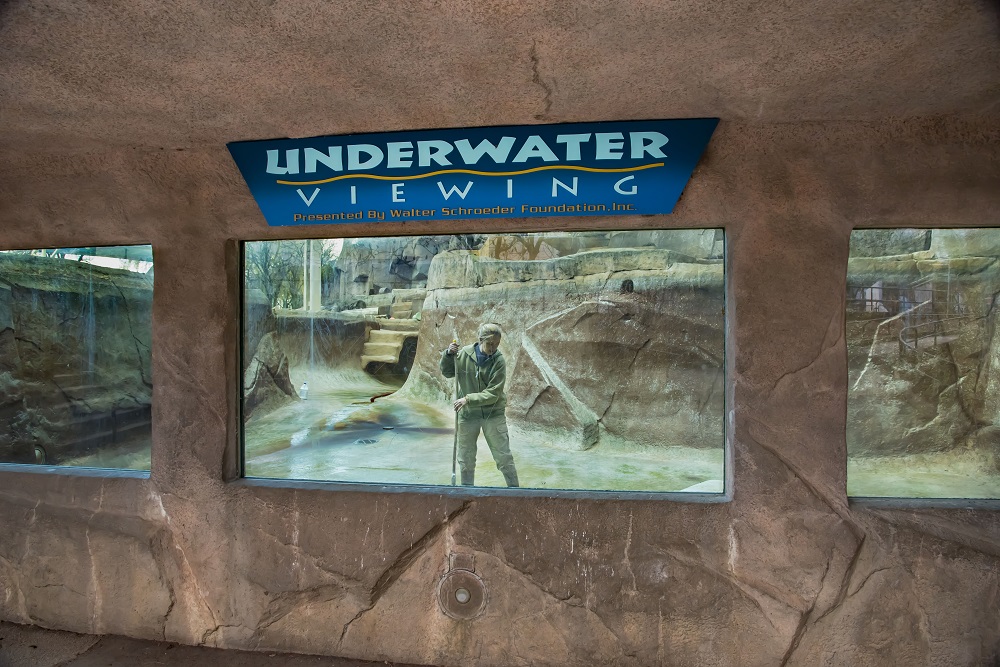
Milwaukee County Zoo area supervisor Dawn Fleuchaus cleaning the underwater Harbor Seal habitat. (Courtesy of Milwaukee County Zoo)
Zoos Are Staying Connected Through Social Media
The NEW Zoo and the Milwaukee County Zoo both have active social media pages that have been providing followers with plenty of animal content while their doors are closed.
“We get a comment or two just by the minute of people who appreciate seeing something cute or funny or kind of warms their heart,” Wikenhauser said.
Kawski usually works with a team of interns to manage the NEW Zoo’s social media accounts. Due to the stay-at-home order, she’s now relying more on keepers to send her photos and videos, she said.
Educating the public about animals is an important part of the zoo’s mission, even if it’s done online, she added.
“Our hope is that by teaching people a little bit about [the animals], getting people to appreciate them or feel connected with them, ultimately that helps them want to make a difference to make little changes like recycling or donating to a conservation initiative,” she said.
Unsurprisingly, cute animal pictures seem to get the most traction with followers, Kawski said.
The penguins, red pandas and prehensile-tailed porcupine are always big hits. Recently, the black-footed ferrets have also connected with people who are stuck at home self-isolating thanks to a phenomenon called dead ferret sleep.
“Basically, when they fall asleep, they sleep hard,” she said. “They fall asleep wherever they are, so our ferrets have this habit of like folding themselves in super odd angles and just passing out.”
People can support the NEW Zoo during the pandemic by sharing its posts, purchasing tickets or renewing their memberships, Kawski said.
Maybe There’s A Silver Lining?
At least one Wisconsin zoo is open amid the pandemic, and it wasn’t even the owner’s idea.
Shalom Wildlife Zoo in West Bend encompasses more than 100 acres that visitors usually explore on foot or by golf cart. At Christmas, it opens as a drive thru before closing for winter on Jan. 1.
In normal years, Shalom reopens the last Saturday in April, said owner David Fechter. But this is no normal year.
As the state closed down in response to the coronavirus, the zoo started receiving phone calls and emails. Hundreds of people asked the same thing: Could Shalom open its drive thru so visitors could see the animals while safely social distancing?
Fechter and his team checked with the local authorities to make sure the drive thru wouldn’t violate the state’s stay-at-home order. Then they got to work on winter maintenance, hauling in 150 truck loads of gravel to enhance the property’s roads, he said.
When the zoo opened more than a month ago, it was clear the work paid off.
“It was like a flood,” he said. “The people were coming. It was crazy how many people were coming.”
Some visitors have traveled from Chicago to see the animals. Others have returned as many as four times, Fechter said. On weekends, the line to get in can reach over an hour. On a busy day, it might take another two hours to drive through the property.
Guests can expect to see brown bears, tigers and even herds of bison and deer, Fechter said. The roads are lined with educational signs.
Fechter knows it’s a challenging time, but sometimes something good can come out of something bad, he said.
“It’s just such a wonderful thing how families are tuning back into each other and tuning into nature,” he said. “How can you go wrong there?”
==
MUSIC: “At The Zoo” by Don Costa


